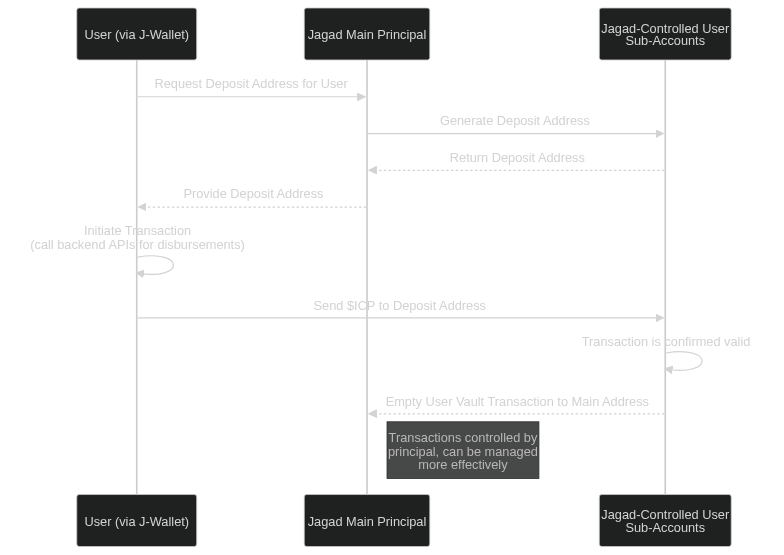Streamline the management and indexing of principal sub-accounts for ICRC transactions.
ICSI (ICP Sub-Account Indexer) is a robust solution designed to streamline the management and indexing of sub-accounts within the ICP (Internet Computer Protocol) ecosystem. This project aims to enhance the efficiency, security, and scalability of handling multiple sub-accounts under a single principal, making it easier for users and administrators to manage their ICP assets.
The ICSI canister provides methods that allow organizations to primarily carry out several operations:
- Generate sub-account-id in the form of hex_string
- Track incoming ICP-token transfers into created sub-account-ids
- Manage ICP-tokens that reside in the sub-account-ids
If you are interested in learning more from the builders of ICSI, you can watch the product pitch and presentation in the attached videos below:
- Jagad ICSI - Product Pitch
- Jagad Presentation in ICP Office Hour - Stephen Antoni
- Jagad App Short Product Demo
ICSI simplifies the process of managing sub-accounts by providing a clear and intuitive interface for creating, tracking, and managing sub-accounts. Users can easily generate new sub-accounts and view transaction histories without dealing with the underlying complexities.
Security is paramount in ICSI. By leveraging the ICP's robust security features and integrating additional validation mechanisms, ICSI ensures that all transactions are secure and compliant with best practices. Features like illicit transaction detection and refund capabilities add extra layers of protection for users' assets.
ICSI is built to scale. With efficient indexing and transaction handling, the system can manage tens of thousands of sub-accounts without compromising performance. The design ensures that querying and managing transactions remains fast and reliable, even as the number of users grows.
ICSI uses a sophisticated mechanism to derive sub-accounts from a single principal ID. Each sub-account is generated using a combination of the principal ID and a subaccount number, ensuring privacy and uniqueness. This allows for an infinite number of sub-accounts under one principal.
Transactions are tracked and managed efficiently. ICSI can list, clear, and refund transactions across sub-accounts, ensuring that all financial activities are transparent and manageable.
ICSI incorporates a sweeping mechanism to centralize funds from sub-accounts to a main principal account. This process involves validating transactions and ensuring that only legitimate deposits are swept to the main account.
ICSI is built with a focus on modularity and extensibility. The core components include:
- Subaccount Management: Efficient handling of subaccount creation and indexing.
- Transaction Handling: Robust mechanisms for listing, clearing, and refunding transactions.
- Security Features: Integration with third-party services for transaction validation and illicit activity detection.
The canister provides several methods to assist with ICP-token deposit management. The complete methods can be observed inside Candid File
add_subaccount : () -> (variant { Ok : text; Err : Error });
This method returns sub-account-id in hex_string format.
sweep : () -> (variant { Ok : vec text; Err : Error });
This method forwards ICP-token that are sitting on each sub-account-ids
single_sweep : (text) -> (variant { Ok : vec text; Err : Error });
This method forwards ICP-token that was transacted within a single tx_hash provided in the argument
To deploy the ICSI canister, use the deploy.sh script. This script supports both local and IC network deployments.
# Deploy to local network
.maintain/deploy.sh --network local
# Deploy to IC network
.maintain/deploy.sh --network icFor a clean start on the local network, use the --clean flag:
.maintain/deploy.sh --network local --cleanFor a complete step-by-step guide to deploying the Canister, refer to the Deployment Guide.
The test.sh script provides a comprehensive test suite for the ICSI canister. It can be run with or without deployment:
# Run tests with deployment
.maintain/test.sh --network local
# Run tests without deployment
.maintain/test.sh --network local --skip-deployThe index.js file provides an interactive CLI for interacting with the ICSI canister. It can be used in two modes:
-
Interactive mode:
node .maintain/script/index.js
This will present a menu of available operations.
-
CLI mode:
# Add a subaccount node .maintain/script/index.js --cli add_subaccount # Set webhook URL node .maintain/script/index.js --cli set_webhook_url https://example.com/webhook
For a comprehensive explanations for the scripts, refer to the ICSI Scripts Guideline.
ICSI represents a significant advancement in the management of ICP sub-accounts, offering simplicity, security, and scalability. By leveraging advanced indexing and transaction handling techniques, ICSI provides a reliable and user-friendly solution for managing ICP assets.
The following are some of the research documents during specification design:

